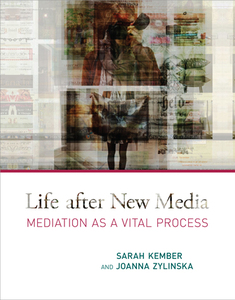Life after New Media: Mediation as a Vital Process
Kember, Sarah and Zylinska, Joanna. 2012. Life after New Media: Mediation as a Vital Process. Cambridge, MA: MIT Press. ISBN 978-0-262-01819-7 [Book]
![[img]](https://research.gold.ac.uk/4165/1.hassmallThumbnailVersion/life_after_new_media.jpg)
|
Image (Book Cover)
life_after_new_media.jpg - Published Version Download (129kB) | Preview |
Abstract or Description
This co-authored monograph critically examines the current debate on ‘new’ or ‘digital’ media. It makes a case for a significant shift in the way new media is perceived and understood: from thinking about ‘new media’ as a set of discrete objects (the computer, the mobile phone, the iPod, the e-book reader) to understanding media predominantly in terms of processes of mediation.
The argument is threefold:
(1) In an era when being on Facebook or Twitter, having a smart phone or a digicam, and obtaining one’s genetic profile on a CD after being tested for a variety of genetic diseases has become part of many people’s everyday lives, we maintain that there is a need to move beyond the initial fascination with, and fear of, ‘new’ media; and beyond the belief in their alleged ‘newness’, too.
(2) There is also a need to look at the interlocking of technical and biological processes of mediation. Doing so quickly reveals that life itself has become a transient medium, which is subject to the same mechanisms of reproduction, transformation, flattening and patenting that other media forms (CDs, video cassettes, chemically printed photographs, and so on) underwent previously.
(3) If life itself is to be understood as a medium, we need to critically examine the complex and dynamic processes of mediation that are in operation at the biological, social and political levels in the world, while also remaining aware of the limitations of the stand-alone human ‘we’ that can provide such a rational critique.
The aim in Life after New Media is to achieve something other than merely providing an extension or corrective to the current field of ‘new media studies’. Instead of developing an alternative definition or understanding of new media, the authors refocus the new media debate on a set of processes that have so far escaped close analysis by media studies scholars. In other words, with this book we are not so much interested in moving the debate on new media on, but rather in moving on from the debate on new media; and, in doing so, focusing on the concept of mediation. The distinction is of course primarily heuristic, i.e. provisional and tentative, and the purpose of separating mediation from media is to clarify the relation between them. Mediation does not serve as a translational or transparent layer or intermediary between independently existing entities (say, between the producer and consumer of a film or TV programme). It is a complex and hybrid process, which is simultaneously economic, social, cultural, psychological and technical.
|
Item Type: |
Book |
| Departments, Centres and Research Units: |
Media, Communications and Cultural Studies |
| Date: |
October 2012 |
| Item ID: |
4165 |
| Date Deposited: |
19 Nov 2012 14:58 |
| Last Modified: |
27 Jun 2017 15:13 |
|
URI: |
View statistics for this item...
 |
Edit Record (login required) |

 Tools
Tools Tools
Tools
